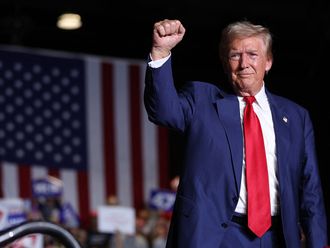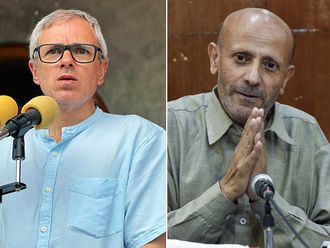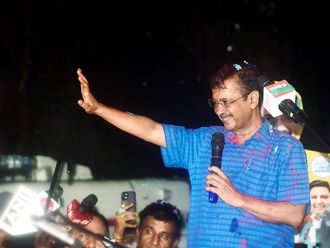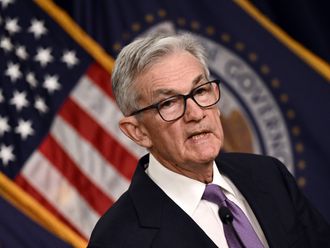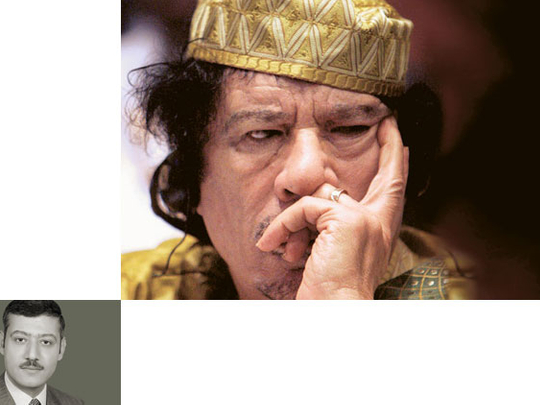
After 42 years of reckless absolute rule, the regime of Libyan leader Muammar Gaddafi seems to have come to an end. Gaddafi is the third victim of the Arab Spring, following the toppling of — Zine Al Abidine Bin Ali of Tunisia and Hosni Mubarak of Egypt — both forced to step down under popular pressure.
Gaddafi will apparently not be the last Arab autocrat to be removed since many others are facing increasingly defiant populations infuriated by authoritarian practices and rampant corruption. Gaddafi is a very special case nonetheless. Some will miss his amusing press appearances; others will for long remember his "strange" character and attitude. For many Libyans his lengthy rule will be always seen as a sheer example of tyranny, recklessness and irrationality.
In fact, Gaddafi, unlike most of his peers, did not seem at any given time to be making decisions on the basis of national interest, domestic public opinion, or at least in accordance with his political convictions.
Indeed, for the past four decades his regime sponsored international terrorism, condoned piracy, kidnapping, plane-hijacking and even hired-killing. That helped portray him as a ruthless dictator and power-hungry nationalist, who very often expressed fascist and explosive social ideas. He was, furthermore, characterised as an agitator, maverick demagogue, irrational fanatic, lunatic, irresponsible, and at times, childish. His weird ideas were depicted as radical and utopian fallacies closer in shape and essence to chauvinism than to traditional nationalism. In addition, Libya's dismal human rights record was another disgrace to the Gaddafi regime.
Indeed, Gaddafi's bizarre personality has helped consolidate most of these ideas. His lack of statesmanship and his method of leading his people very much like a herd have made things even worse. Many still question the benefits of shipping arms to the Irish Republican Army or getting Libya involved in meaningless confrontations, such as the Lockerbie and the UTA incidents.
Besides, Gaddafi's calculations were often made with little regard for diplomacy, realpolitik or the basic rules of political engagement. The last occasion in which his faulty calculations were made clear was his decision in 2003 to dismantle Libya's small arsenal of Weapons of Mass Destruction (WMD). That decision was strongly criticised for handing a life-line for both former British prime minister Tony Blair and former US president George W. Bush, saving them the embarrassment resulting from the failure to find any WMDs in Iraq.
Limited capabilities
In fact, Libya's WMD programmes were, in the worlds of Mohammad ElBaradei, former head of the International Atomic Energy Agency (IAEA), insignificant. Its biological weapons programme was similarly rudimentary, with little evidence of production capabilities.
Libya's missile capabilities were also limited, including its programme to develop long-range missiles. In brief, Libya's chemical, biological and nuclear programmes and ballistic missiles seemed to have been a little more than mere nuisance.
What was crucial then about the Libyan decision hence was not eliminating a threat to the West, but giving London and Washington a justification for the Iraq war in Libya's action, suggesting it had somehow been scared into compliance. In a glamorous manner, former British defence secretary, Geoff Hoon, linked the toppling of Saddam Hussain with Libya's decision to renounce WMD.
"I don't think you can separate out the relevance of military action in Iraq from the decision the Libyans have taken… We showed, after Saddam Hussain had failed to cooperate with the UN, that we meant business and Libya — and I hope other countries — will draw that lesson". Bush also celebrated the ‘diplomatic triumph' and in a live television address he said the move was of ‘great importance' and came as a result of [our] resolve and determination to rid the world of WMDs.
Indeed, cleaning the world of WMDs is a good thing to do, yet the Libyan decision could have been of greater magnitude and could have served Arab causes better had it been made as part of a coordinated Arab effort for a comprehensive deal that would include dismantling Israel's huge arsenal of WMDs and make the Middle East a nuclear-free zone.
While Gaddafi had always been generous in pleasing the West —both politically and financially — he has dealth with his own people with an iron fist. Until recently, he acted as the owner of the country and its resources. His removal must be seen as a great development for Libya and the Arab world at large.
Dr Marwan Kabalan is a lecturer in media and international relations at Damascus University's Faculty of Political Science and Media in Syria.



